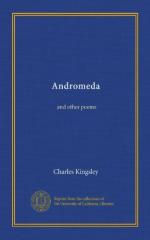Three wives sat up in the lighthouse tower,
And they trimmed the lamps as the
sun went down;
They looked at the squall, and they looked at the
shower,
And the night-rack came rolling
up ragged and brown.
But men must work, and women must
weep,
Though storms be sudden, and waters
deep,
And the harbour
bar be moaning.
Three corpses lay out on the shining sands
In the morning gleam as the tide
went down,
And the women are weeping and wringing their hands
For those who will never come home
to the town;
For men must work, and women must
weep,
And the sooner it’s over,
the sooner to sleep;
And good-bye to
the bar and its moaning.
Eversley, June 25, 1851.
SONNET
Oh, thou hadst been a wife for Shakspeare’s
self!
No head, save some world-genius, ought to rest
Above the treasures of that perfect breast,
Or nightly draw fresh light from those keen stars
Through which thy soul awes ours: yet thou art
bound—
O waste of nature!—to a craven hound;
To shameless lust, and childish greed of pelf;
Athene to a Satyr: was that link
Forged by The Father’s hand? Man’s
reason bars
The bans which God allowed.—Ay, so we think:
Forgetting, thou hadst weaker been, full blest,
Than thus made strong by suffering;
and more great
In martyrdom, than throned as Caesar’s
mate.
Eversley, 1851.
MARGARET TO DOLCINO
Ask if I love thee? Oh, smiles cannot tell
Plainer what tears are now showing too well.
Had I not loved thee, my sky had been clear:
Had I not loved thee, I had not been here,
Weeping by thee.
Ask if I love thee? How else could I borrow
Pride from man’s slander, and strength from
my sorrow?
Laugh when they sneer at the fanatic’s bride,
Knowing no bliss, save to toil and abide
Weeping by thee.
Andernach on the Rhine,
August 1851.
DOLCINO TO MARGARET
The world goes up and the world goes down,
And the sunshine follows the rain;
And yesterday’s sneer and yesterday’s
frown
Can never come over again,
Sweet wife:
No, never come over again.
For woman is warm though man be cold,
And the night will hallow the day;
Till the heart which at even was weary and old
Can rise in the morning gay,
Sweet wife;
To its work in the morning gay.
Andernach, 1851.
THE UGLY PRINCESS
My parents bow, and lead them forth,
For all the crowd to see—
Ah well! the people might not care
To cheer a dwarf like me.
They little know how I could love,
How I could plan and toil,
To swell those drudges’ scanty gains,
Their mites of rye and oil.




